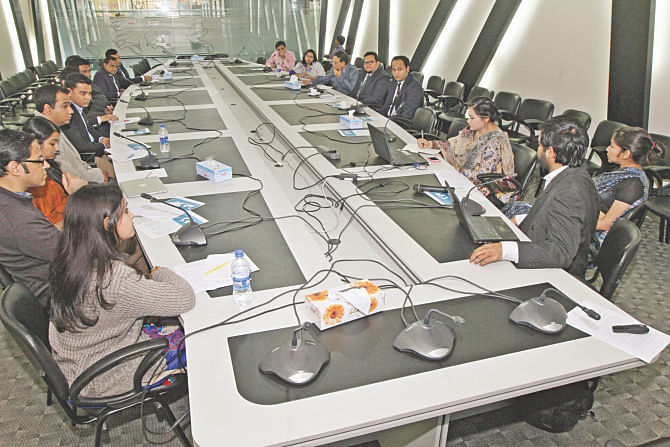Free legal aid can boost social services
Free legal aid can boost social services
Discussants tell iProbono roundtable

Considered problem solvers and voices playing a pivotal role in bringing positive change, Bangladesh's lawyers, law firms and academics can offer free services and skills, including research and corporate advice, to civil society and non-government organisations from time to time, enhancing operations and ensuring legal rights of the disadvantaged and marginalised communities.
The recommendations came at a roundtable, “Lawyers as Changemakers”, organised by iProbono at The Daily Star Centre in the capital yesterday.
Pro bono means for the public good and the online platform tends to do just that, connecting non-profits, social enterprises and civil society organisations with providers of free legal support.
Operating globally since 2009 with field offices in London and New Delhi and with support from the Ford Foundation and Commonwealth Foundation, iProbono is now expanding services in Bangladesh.
Eleven law firms and non-government and legal aid organisations attended the roundtable to discuss the existing pro bono culture, challenges and potential solutions to implement such initiatives.
Providing a lot of scope to learn and improve the breadth and depth of legal practice skills, such assignments can be taken up by young lawyers, said Ahnaf Chowdhury, a trainee of Dr Kamal Hossain and Associates.
Barrister Tanjibul Alam said despite the presence of an adequate number of lawyers and clients and many organisations providing free legal services, a lot of people were still suffering for not being able to afford a good lawyer.
“What we are missing here is the link,” he said, suggesting chalking out long-term plans.
Barrister Rimi Nahreen of Ahmed and Associates said the country's 82 bar associations can suggest the over 52,000 lawyers here to provide free services, at least for a couple of hours a year, which will be of great help for society.
“We, the lawyer community, can launch a campaign to encourage our fellow lawyers in this regard,” she added, pointing out areas for skill-based volunteering including compensation cases and raising awareness on rights and existing laws.
The general population of Bangladesh are unaware of existing laws and the channels through which to access legal support, said Barrister Abdul Halim, chairman of Children's Charity Bangladesh.
Ishita Dutta, a researcher of Bangladesh Legal Aid and Services Trust, pointed out the importance of legal advice for administrative sections on carrying out reviews of employment contracts and adhering to regulatory compliance, something organisations face and need support with.
“I don't expect that iProbono will help individual cases of any incident, rather it can help in policy advocacy,” said Abdullah al Mamun, research coordinator of Manusher Jonno Foundation.
“Our plan to expand into Bangladesh is very recent and we would like to help the legal sector in institutionalising pro bono in a way that allows everyone to access the necessary legal support,” said iProbono Bangladesh Country Director Shaveena Anam.
Raihan Islam, country manager for iProbono in Bangladesh, highlighted the activities of the platform.
Saqeb Mahbub of Mahbub & Company; Mohibul Hassan Chowdhoury, junior partner in The Legal Partner; Sanwar Hossain, a partner in S Hosain & Associates; Sobel Nawaz, associate, Sadat Sarwat & Associates; and Mitali Jahan, project coordinator, Bangladesh National Women Lawyers' Association, also spoke.